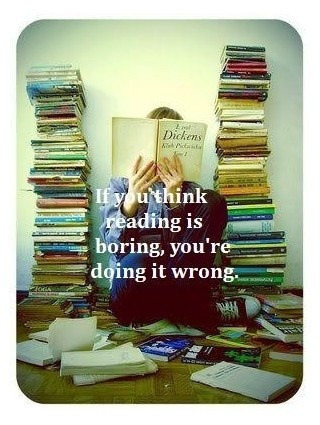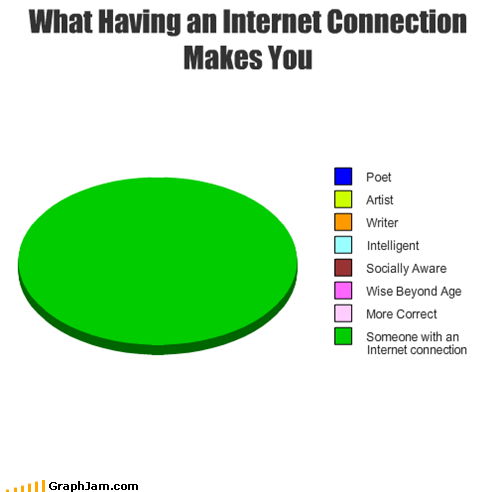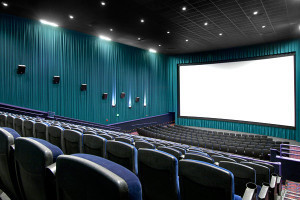Tyson Adams's Blog, page 71
June 2, 2014
Poe vs. King rap battle
This is ten kinds of awesome.
Tagged: Awesome, Edgar Allan Poe, Epic Rap Battles, ERB, Humour, Right What You No, Stephen King, Tyson Adams

May 26, 2014
I love to hate tech articles: internet speed
I love technology. So many cool things have been made during my lifetime that it is hard to believe that as a 30-something I can remember a time before mobile phones, laptops, CDs, DVDs, tablets, and even personal computers. Since I love technology and love to read, it is a no-brainer for me to keep abreast of the latest developments via tech articles, especially since these articles are so woefully out of touch with the average person that they are comedy gold.
The article that tickled my funny-bone this time was all about Google’s new internet service. As part of Google’s plans for world domination, whilst not being evil of course, they are entering the market with an optical fibre broadband rollout in the USA. This video explains the deal with Google Fibre (video a little old now):
The funny part is the article author lamenting his current internet pricing and speeds relative to the service offered by Google:
My $52-per-month plan bestows me with the unheralded power of 30Mbps down and 5Mbps up, a depressing far cry from the (Google Fibre) $70 (and 1 Gbps up and down).
Sorry, not funny ha-ha, but funny sad. According to the reports into global internet speeds, the average US internet user is downloading at 10Mbps, with only 34% of users getting speeds above that (see figure below), ranking them top 10 in the world for speed.
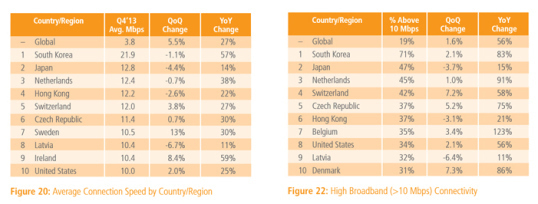
Akamai State of the Internet Report Q4 2013
Meanwhile my Aussie internet is ranked 44th in the world, with average speeds of 5.8Mbps and 9.7% of users having average speeds higher than that.
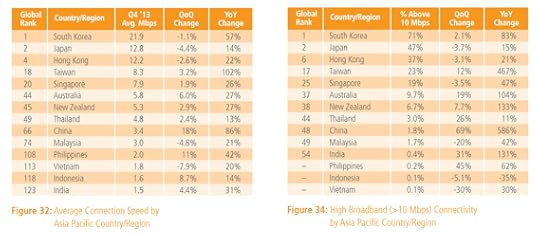
Akamai State of the Internet Report Q4 2013 – Asia
So the tech author was lamenting internet that not only ranks as some of the best in the world, but is also some of the cheapest. In Australia we have some the most expensive broadband in the world (although not as a % of income) and the service is quite possibly far worse than our average speeds would suggest. Just a few kilometres from where I’m sitting, deep in rural Australia, there are people who can’t get the internet. Whilst I have above average internet at work and at home – although that average bar is low enough for an asthmatic 2 year old with no coordination to jump over – the copper network is antiquated and slows the speed of internet down the further you get from the hub. Once you are 20-30 kilometres out of town, the internet is so slow that you are running dialup speeds, which is ridiculous and annoying when most of the web assumes broadband speeds. These slow speeds means that most people not in town have satellite broadband, which is speed limited by the number of users at any one time, is really expensive, and even the top speeds are capped at 800kbps. No, I’m not kidding.
Australia isn’t even in a position to climb the internet rankings in any great hurry either. There were two broadband plans taken to the last Australian election: Fibre to the Home and Fibre to the Node. Since optic fibre (that stuff Google is rolling out) is only going to the node, that means people in cities will have to pay to get their connection upgraded, while we can now expect to see most rural areas of Australia covered by satellite plans (the ones I just told you sucked). Both of these options are more expensive regionally or where the “node” is a long way from the “home”. See the outline below (source):

Access to the internet is a wonderful thing: information at your fingertips, streaming news and entertainment, commerce on a global scale, and lots of porn. Australia is not really in the digital age, limping along with second-rate connections, political plans for second-rate upgrades, and monopolies charging big $$ for second-rate services. Which is why the tech articles are so interesting in the way they show the massive disconnect between the writers, tech services, and the rest of the world.
See other articles: http://spectrum.ieee.org/telecom/internet/the-rise-and-fall-of-australias-44-billion-broadband-project
http://www.politicalscience.com.au/2010/04/why-we-need-national-broadband-network.html
http://en.wikipedia.org/wiki/Internet_access
Tagged: Australia, Broadband, Dialup, Fibre internet, Fibre to the Home, Fibre to the Node, Google, internet, internet speeds, Politicians, Politics, Right What You No, Satellite, Tech articles, Technology, Tyson Adams, USA

May 21, 2014
Lying about books you’ve (not) read
As with most things Hank and John Green are involved with, I have become a fan of Mentalfloss. Their recent article on embarrassing things we all do was interesting, but had one point in it that made me think “what the hell is wrong with you people”.
By “you people” I obviously mean it in the pejorative dissociative sense, in that I’m not having a shot at you, or Mentalfloss, just the ubiquitous and ethereal “them” and “you”. Unless of course what I’m about to write does hit home, in which case, stop it now!
One of the items listed as an embarrassing thing that everyone does, was people claiming to have read books and watched movies they haven’t in order to appear more intelligent. I have previously discussed the list of books people claim to have read and I’m not ashamed to say I’ve haven’t read certain “classics”. I do have to admit to having claimed to have read a book I haven’t, To Kill a Mockingbird (still on my TBR pile), but that is also why I’m coming out against the practice.
And that is the point I wish to make here, there is no shame in not having read a classic book or watched a classic film. Maybe you don’t like extraordinarily long and self-indulgent wedding scenes in a movie (Deer Hunter). Maybe you don’t like novels with more than 450 main characters (War and Peace has over 500). There isn’t any shame in that. And how many “classics” have gone unread because they were in the wrong language, poorly translated, never got published, or just lucked out (John Green made mention of this recently).
Essentially we are worried about our subjective taste disagreeing with someone else’s subjective taste. The stupidity here is that we are being judged for something we haven’t done, rather than a strong opinion one way or the other on the actual topic. If we came out and said “Well, I hated 1984, it was rubbish” or conversely “Well, I loved 1984, and anyone who says it’s rubbish is a poo-poo head” we’d get into deep arguments about the relative merits of the novel. That is perfectly acceptable. But if we say “I haven’t read that one (yet)” or “Never seen it” then the response is something along the lines of calling us crazy, implying we have lived too sheltered a life, and/or that we have missed out on something great.
They could be right, of course. We may have missed out on the single most impressive book or movie ever. Our lives may be dramatically improved by reading or watching the work in question.
Or not.
The reality is that it really doesn’t matter. Some people will never have enjoyed a Jack Reacher adventure, or clung to the edge of their seat reading a Matthew Reilly novel, because they have been busy reading all the “great literary works”. Who is to say that their choice of entertainment was superior? Some people prefer to watch sports: are they any less entertained?
I think we have to stop pretending that our subjective opinions are something to be ashamed of. Like what you like, don’t be ashamed to say so either. I’m always amazed at the number of closeted Buffy fans there are, which only shows how damaging this mindset of “worthiness” is.
Tagged: 1984, Books, Classic books, Classic films, classic literature, Classic movies, Classics, Deer Hunter, Films, Hank Green, Jack Reacher, John Green, Matthew Reilly, Mentalfloss, Movies, Novel, opinion, Reading, Right What You No, Subjective, Subjective taste, To Kill A Mockingbird, Tyson Adams, War and Peace

May 12, 2014
The pros and cons of owning a toddler
Pro: They are easy to entertain with just about anything.
Con: They want to turn everything you own into a sticky, finger-mark covered, toy.
Pro: They make charming noises as they play, running around being delighted by any and everything.
Con: They make noise the entire time about any and everything, usually at ear splitting volumes.
Pro: You’ll have so many social events to attend that you’ll be flat out partying.
Con: All of those social events involve other people’s toddlers, usually mashing food into the carpet.
Pro: You will have everyone buying your toddler clothes and toys so you won’t have to spend much on clothes and toys.
Con: Everything costs more with a toddler and you won’t be able to walk through your house without tripping over all of the crap your toddler has been given.
Pro: They spend a lot of the day sleeping, so you get plenty of down-time.
Con: You spend most of the day trying to get them to sleep because they refuse to take a nap despite being so tired they just want to cry.
Con: All that down-time is spent cleaning, cooking and basic personal hygiene that can’t be managed whilst the toddler is awake.
Pro: Someday they’ll be grown up and able to support you as you age.
Con: You’ll probably do a crap job of raising them and they’ll decide to put you in a home with only one staring window.
Tagged: Babies, Baby, Children, Funny, Humor, Humour, Parenthood, Parenting, Pro vs Con, Pros and Cons, Right What You No, Toddler, Tyson Adams

May 8, 2014
Book review: Freezing Point by Karen Dionne
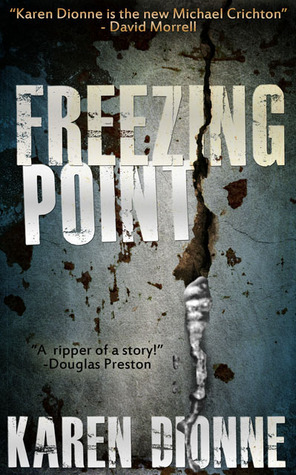 Freezing Point by Karen Dionne
Freezing Point by Karen Dionne
My rating: 4 of 5 stars
For anyone not familiar with the Killer Thrillers group, Karen is one of many great authors who are on the list with Zoe Sharp, Sean Black and Boyd Morrison (to name just 3 off of the top of my head). They have a tag-line: Great reads – guaranteed. I think it holds true.
Anyway, Freezing Point is an eco-thriller that moves along at a cracking pace. Plenty of conspiracies, corporate greed, wacky environmentalists, scientists in the frozen wilds, idealists caught in a mess, and rats that have developed a taste for humans, all competing for the most precious resource: water.
I enjoyed this novel, which I believe is the first in a series of related eco-thrillers by Karen. The only thing I disliked was the abrupt ending. I felt there was more to come, several chapters worth, but it was wrapped up with a few lines in what was essentially an epilogue. Regardless the “great reads” tag-line holds true.
Tagged: Book review, Book reviews, Boyd Morrison, Eco-thriller, Freezing Point, Karen, Karen Dionne, Killer rats, Killer Thrillers, Reading, Right What You No, Sean Black, Thriller, Tyson Adams, Zoe Sharp

May 7, 2014
Book review: The Heist by Janet Evanovich and Lee Goldberg
 The Heist: A Novel by Janet Evanovich
The Heist: A Novel by Janet Evanovich
My rating: 4 of 5 stars
I have to admit, I haven’t read a Janet Evanovich book in years, despite my wife having most of them on our shelf. I haven’t read a Lee Goldberg book in a least a couple of months. So when I picked up this collaboration between two witty and highly entertaining authors I was playing “try to figure out who wrote which bits” without any success. Unlike some author collaborations, this was an actual collaboration.
I will now try to write a paragraph without using the word ‘collaboration’…… Dammit!
Lee and Janet have written a very entertaining novel and I think this will make for a cool series of adventures. The setup is the standard odd couple device we’ve seen done to death. Fortunately Lee and Janet have the charged paddles of ‘interesting take’ on the odd couple romp. I think it was the stock moments that kept this good novel from being great. Then again, they did manage to include a conman, FBI agent, thief, corrupt lawyer, embezzler, fake drug lord, and real pirates in the same heist novel. Add in ninjas for the next one and it could be perfect.
Tagged: Book review, Book reviews, collaboration, FBI, Heist, Janet Evanovich, Kate O'Hara, Lee Goldberg, Nick Fox, Odd couple, Reading, Thief

May 6, 2014
To block or not to block: that is the question.
The internet is a wonderful place to find information on just about any topic you can imagine and few you can’t. From the latest scientific study to the grumpiest cat, from insightful commentary to rule 34: the internet has it all. The problem is that not everyone is rational, logical, nor well informed, and they still have internet connections and the ability to make webpages and comment on social media.
As someone who tries to share science and knowledge with people, I love to engage and discuss topics. If I can help someone understand or learn something about a complex topic, then I feel like I’ve accomplished something. The more science communicators out there doing the same thing, the slightly better the world becomes. This better understanding leads to better decisions, better ideas, better inventions, better cat photos.
The problem is that not everyone appreciates being told that they are mythtaken or wrong. Others are adamant that they aren’t wrong. People will argue against the overwhelming scientific evidence on topics like climate change (real, man-made, we need to do something about it), genetic modification (breeding technique, cool innovation that is more precise and has great potential), modern medicine (seriously!?!), evolution (as solid a theory as gravity), and even the shape of the Earth (yes, flat-Earthers still exist). This anti-science nonsense is thankfully on the losing team, they just aren’t playing with a full deck.
It is these science deniers that are the most frustrating to deal with on social media and the internet. There is no evidence you can show them that won’t be dismissed – often as a conspiracy – and there is no rationality to their arguments. But they can also be very convincing to people who don’t know enough about a topic, which is how myths get started. And that is dangerous, once myths are started they are very hard to get rid of. So it is actually important to make sure that the science deniers aren’t existing in an echo chamber, which the internet has facilitated to some extent – I’m looking at you Alex Jones, Mike Adams and Joseph Mercola!
These science deniers can be a menacing drain of time, effort and inner calm. The easiest way to deal with them would be to block them, excise the wound, possibly burn the evidence of their existence. But then the science deniers have won. Their echo chamber is just that little bit more echo-y. But the echo chamber is going to keep echoing regardless, as discussed above. But won’t somebody think of the children!
I really hate blocking people on social media. The science denier drivel may pollute my newsfeeds, but blocking them also leaves me open to my own echo chamber. Sure, I might think I’m good at picking good information from bad, but if my thinking is never challenged, how can I be confident I’m not falling for confirmation bias? I guess this is the Catch 22 of the modern age, but with more cats.
Tagged: Anthropogenic climate change, Anthropogenic global warming, anti-GMO, anti-science, Blocking, Catch 22, climate change, Commentary, Evolution, Flat-Earthers, global warming, GM, GMO, internet, internet connections, Rule 34, Science, Science denial, Science deniers, Social media, Trolls, Tyson Adams

April 29, 2014
The decline of cinema
There is only really one thing I miss about living in the city and that is going to the cinema. Of course, I’d miss that even more if there were movies worth shelling out this month’s mortgage repayments to see. The idea of paying big bucks to sit in a seat that has probably been used for sex by strangers, eating snacks that have a 2000% markup, after forgetting your earplugs and going partially deaf, which is a blessing after the pre-movie ads, is just not that appealing. Now Australian cinemas have decided they aren’t charging movie goers enough money and have decided to blame an easy target to justify their cash grab.
Cinema executives have blamed piracy on the recent price rises of ticket prices in Australia. Because of course it is piracy that is to blame, and not the marginalising of the customer base with exorbitant pricing regimes. Nor could it possibly be that people have more alternate entertainment options, including waiting a few months to watch the latest “blockbuster” in their own home cinema. Nor could it be the rubbish that so many movie studios are turning out.
Let’s dissect this nonsense like the original reports in the media should have done. There are many factors at play in the decline of cinema. The first real problem is that there hasn’t really been a change in the proportion of the population that go to the cinema in 40 years, but the number of times per year they go has been steadily declining since the 90′s.
ATTENDANCE
(% BEEN TO THE CINEMA IN THE LAST 12 MONTHS)
FREQUENCY
(AVERAGE NO. VISITS PER YEAR)
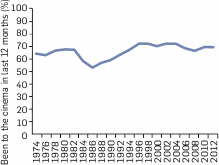
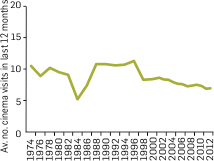
So rather than keeping audiences entertained regularly, audiences are clearly becoming more occasional customers. Underneath that general trend are some interesting changes in the demographics of cinema attendance. It is no secret that Hollywood movies are made for teenagers. Teens are a huge chunk of the cinema audience. But, the biggest change in the repeat attendees is in the teen market, which has been in steady general decline since the 70′s. Which part of the market is going to be most impacted by price rises? Go on: guess!
ATTENDANCE RATE
(% BEEN TO THE CINEMA IN THE LAST 12 MONTHS)
FREQUENCY
(AVERAGE NO. VISITS PER YEAR)
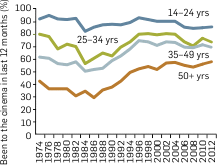
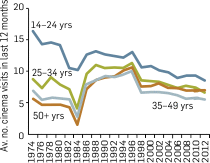
Another way to look at this is in the proportion of the population going to cinemas in the age demographics. Below you can see the 14-17 and 18-24 age groups are overrepresented as cinema goers, this starts to even out in the 25-34 group (also known as the settling down and going out less demographic), is at parity in the 35-49 group (also known as the parenthood has stolen my social life demographic), and people over 50 clearly don’t like all the loud noises.
AGE PROFILE OF CINEMA-GOERS COMPARED TO THE AUSTRALIAN POPULATION
OVER THE AGE OF 14, 2012
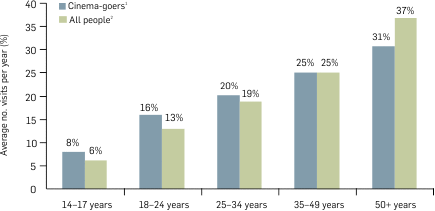
So while the proportion of the population that have been going to the cinema each year has been pretty steady across the entire population, it is the number of times people go that is making the difference, especially in that much coveted teen “I want to see explosions and car chases” market. (Interesting aside: when you look at the age group breakdowns you do see that the over 25 audience since the 70′s have generally increased in their likelihood to attend the cinema, but this has been static for most demographic groups since the mid 90′s.) To put some hard numbers on that difference in the number of times a teen goes to the cinema each year, in 1974 the 14-24 demographic averaged 16.4 visits to the cinema, in 2012 that had dropped to 6.6 visits.
Obviously there are a lot of changes in the marketplace that have occurred over this time. TV has expanded, cable TV is a thing now, home rental or ownership of movies is a thing (VHS succeeded by DVD, now being superseded by Streaming, which will probably be superseded by actors coming to your house to perform on demand), computer games have grown in leaps and bounds, the internet, all vying for our attention and wallets. Just look at the change in households with various alternatives to cinema (NB: the game consoles data doesn’t tell the full gaming story, see this for more about that market):
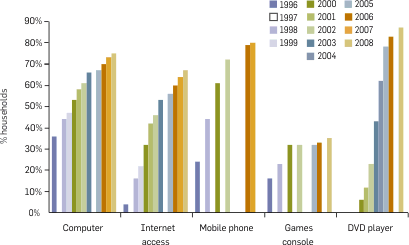
I alluded to this above, but one big change has been the home cinema. Some people will remember a time when some cinema screens were actually not much bigger than the ones installed in many homes now. Sound systems have improved greatly over the crappy little speaker that was the drive-in experience. Now we have high quality TVs and projection units that rival anything you can get in a cinema complex, and these come with a pause function, easy access to food that doesn’t kill your wallet nor beat your heart with belly flab, and sound settings lower than jackhammer. Then you have all the other possible entertainment options available, suddenly the list of movies (not) to see just isn’t as appealing.
The one thing cinemas still have going for them is windowing. For the first few months after opening, there is no other (legal) way to watch the film, you have to watch it in the cinema or wait for the DVD release. Although it seems clear people are more willing to wait, let the dust settle after opening weekend, and figure out what is worth watching, whether that be at the cinema, on DVD, when it makes it to TV, or at all. And now I’m going to contradict myself and say that piracy proves people aren’t willing to wait for those other options, preferring simultaneous releases. Both arguments still point out that people just aren’t as interested in paying big(ger) bucks to see movies in the cinema. Of course movie studios and distributors don’t like that idea, since windowing is great for their bottom line, especially opening weekend.
Now the reason for the price rise could be something to do with this chart, showing that 21% of the market is in the highest income households. Cinemas are obviously betting that their price elasticity is low and will take the price increase in their stride. What this ignores is the age demographic data above, which shows a sizeable chunk of the audience may be from affluent households, but that doesn’t mean their teenage bank account is bulging with lots of cash.
Equivalised gross household income quintiles
No. cinema-goers (’000)
Share of cinema-goers (%)
Attendance rate (%)
Lowest quintile
1,010.6
9.7%
47.2%
Second quintile
1,305.6
12.5%
50.8%
Third quintile
1,879.1
18.0%
66.6%
Fourth quintile
2,106.4
20.2%
75.3%
Highest quintile
2,199.2
21.1%
80.0%
Unknown
1,930.5
18.5%
65.8%
Total
10,431.4
100%
65.2%
So we see that cinema audiences are becoming more occasional consumers, the trip to the movies is a special event, not a regular event. Teens are a big chunk of the cinema market and they aren’t the repeat customers they used to be. This is what happens when you price customers out of the market, you bite the hand that feeds. You also have them turn to other entertainment mediums. Blaming piracy for what is demonstrably a long term trend is a pretty big reach. I’d also argue that piracy is a reaction to consumer demand for lower pricing and simultaneous releasing, so that audiences can consume the movies in the way they want to, not the way they are being forced to, at a price that is commensurate with the utility received (e.g. people pay as much or more for a DVD – less if you consider it a couple or family purchase). If cinemas have anyone to blame it is themselves and their suppliers (distributors and studios). Using piracy to justify a price increase is clearly unfounded.
Of course, what needs to be mentioned is that films are essentially a loss leader for cinemas so that they can make money selling snacks and beverages. This ticket price increase is probably driven through the supply chain rather than by the cinemas themselves. But this also shows how cinemas have to adapt in order to survive. Going out to a movie is an experience. People are more willing to pay for experiences rather than stuff (DVDs). So if cinemas can get serious about screening experience at a fair price, they might get the audience back, or at least stop the decline.
Tagged: Age, Audience, Cinema, Cinema audience decline, Cinema decline, Cinemas, Demographics, DVD, Facts, Home theatre, Movies, opinion, Piracy, Release, Right What You No, Statistics, Stats, Teen, Teens, TV, Tyson Adams, Windowing

April 28, 2014
Did I mention: all men are evil!
 The Australian media have a few targets they rely upon to generate readers: dole bludgers, terrorists, boat people, terrorist boat people, dole bludging terrorist boat people. Today Tracey Spicer decided to add men to that list with her article: I don’t want my kids sitting next to a man on a plane.
The Australian media have a few targets they rely upon to generate readers: dole bludgers, terrorists, boat people, terrorist boat people, dole bludging terrorist boat people. Today Tracey Spicer decided to add men to that list with her article: I don’t want my kids sitting next to a man on a plane.
Now clearly, whilst men are to blame for most wars, most economic problems, most political problems…. Okay, men are shit. But it is just a little bit sexist to declare all men are pedophiles. It is even more misleading of Spicer to make arguments justifying the myths and misconceptions about child sexual abuse. She starts her article by insisting that despite 90% of abuse being perpetrated by someone the child knows, that a stranger on the plane better not be male and sitting next to her kids. Let’s just ignore that entire issue of proximity of people on a plane not changing that much by moving one seat away.
Spicer is very concerned about the “more and more” unaccompanied minors flying and how airlines should be making kids as safe as possible on flights. First of all: “more and more”, seriously? I did a search for some statistics on unaccompanied minors flying and came up as empty as the “more and more” statement. Secondly, the safest possible option would be for a suitable guardian to travel with the kids when flying. Preferably this person accompanying the child would be unrelated to the child, over the age of 40 and Tasmanian. But I guess it is too much to ask for concerned parents like Spicer to travel with their kids.
The big problem with the article is that it buys into the common myths and misconceptions associated with child sex offenders. The Australian Institute of Criminology study listed the top five:
not all child sex offenders are ‘pedophiles’. That is, child sex offenders are a heterogeneous group with varying offender profiles;
children are usually abused by someone they know, although data suggest that strangers comprise nearly one in five perpetrators of child sexual abuse against males;
not all child sex offenders have been victims of sexual abuse themselves and there are complex relationships between being a victim of child sexual abuse and becoming a perpetrator, which require further research. It is important to recognise that while many offenders report a history of being sexually abused, most victims of child sexual abuse do not become perpetrators later in life;
while not all child sex offenders have high rates of recidivism, a specific subset—those who target extrafamilial male children—do frequently reoffend; and
although it is difficult to accurately determine how many children a child sex offender has already offended against by the time he is detected for an offence, this number varies according to offending profiles and is unlikely to be as high as is commonly assumed. There is, however, a subset of extrafamilial male offenders who abuse high numbers of victims.
Now it is true that child sex offenders are mostly men in a father – child relationship with the victim. But let’s also remember that not all men are rapists, only about 0.012% of us (rate of 12.6 per 100,000 Aussies*). It should also be noted that sexual assault has been decreasing, whilst reporting of assault has improved (probably linked, in my opinion), although sexual assault is still a big problem. So trying to say that kids are in danger of sexual assault from an unknown male in the next seat whilst flying on a plane is nothing more than fear mongering.
The reason Spicer wrote the article is because there have been a few instances on Australian airlines of male passengers being asked to change seats. Most people would be glad to not be sitting next to someone else’s unaccompanied brat, but branding all men as pedos is not really justified, unless it gets the individual blokes a free upgrade to first class, then it’s okay. But articles like this aren’t just pedaling myths and misconceptions, they are ingraining the idea that all men are evil, and that kids aren’t safe around men.
For another indication of how this is impacting society, take a look at some of the gender ratios of teachers: the rate of men teaching in primary and secondary schools is declining, and the younger the student, the less male teachers there are. How can you encourage men to become teachers when people like Spicer are essentially saying that all men are pedos? Spicer admits she is being sexist, but doesn’t realise she is also pedaling myths and misconceptions that hurt more than her sexism.
Of course, since all men are evil, it probably doesn’t matter. Maybe we should just kill all men at birth and save ourselves the trouble.
Another view: http://allsignificantbattles.wordpress.com/2014/04/28/sometimes-people-punish-you-by-giving-you-what-you-want/
* Yes, that figure is misleading because the figure is only for currently incarcerated offenders, and it is an old figure.
Tagged: Airplane, child sex offender, child sex offenders, child sexual abuse, Flying, Men, Men suck, Misconceptions, Myths, Pedophiles, Pedos, Right What You No, Sex offender, Sexism, Sexist, Teachers, Tracey Spicer, Tyson Adams, Unaccompanied minors

April 23, 2014
Happy Birthday Shakespeare
Here is some Epic Rap Battles to honour the occassion.
Tagged: Birthday, Epic Rap Battles, Fun, Funny, Humor, Humour, Right What You No, Shakespeare, Tyson Adams, William Shakespeare, Youtube


